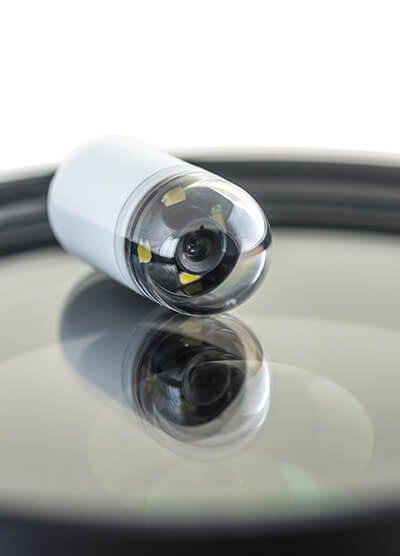Table of Contents
Introduction: Capsule Endoscopy
Did you know that capsule endoscopy is becoming a key method for diagnosing gastrointestinal disorders? This procedure has become a standard of care because it provides a comfortable non-invasive way to examine parts of the digestive system that can’t be readily seen by standard endoscopy procedures, offering a more comfortable alternative to traditional endoscopy.
If you’re considering this procedure, understanding its benefits and the process can help you make an informed decision. In this article, we will explain how capsule endoscopy works, what you can expect before, during, and after the procedure, and why it has become an important tool in modern medicine.
What is a Capsule Endoscopy?
Why is Capsule Endoscopy performed?
Capsule endoscopy is performed when traditional diagnostic tools, such as endoscopy or colonoscopy, are unable to detect the cause of symptoms like unexplained gastrointestinal bleeding, chronic abdominal pain, or persistent diarrhea. It provides a way to examine the small intestine, which is often challenging to assess with standard procedures. Capsule camera exams are NOT a standard way of screening the COLON for cancer and polyps.
This procedure is commonly used to diagnose conditions such as Crohn’s disease, celiac disease, small intestinal tumors and blood vessel malformations which can cause chronic or intermittent bleeding. It is especially beneficial for patients with unexplained symptoms after other diagnostic tests.
How Do I Prepare For A Capsule Endoscopy?
A Day Before the Procedure:
| Food group | Foods not allowed | Foods allowed |
| Milk & beverages. (No red or purple liquids!) | Milk, milk drinks, creamer | Tea or coffee (decaffeinated or regular), carbonated beverages, fruit flavored drinks, sports drinks, crystal light |
| Meats & meat substitutes | All | None |
| Vegetables | All | None |
| Fruits & fruit juices | Fruit juices with unstrained fruit | Strained fruit juices: apple, white grape, lemonade, white cranberry |
| Grains & starches | All | None |
| Soups | All others | Clear broth, consomme |
| Desserts | All others | Clear flavored gelatin, popsicles (no red or purple) |
| Fats | All | None |
| Miscellaneous | All others | Sugar, honey, syrup, clear, hard candy, salt |
On the Day of the Procedure
What Happens During A Capsule Endoscopy?
A capsule endoscopy is a straightforward procedure. Once you swallow the pill-sized camera, it begins to capture images of your digestive tract as it travels through your system. Here’s a breakdown of what happens:
- Sensors are applied to your abdomen and connected to a data recorder you wear around your waist.
- You swallow the capsule with water, and it starts taking multiple images per second as it moves through your digestive system.
- The capsule passes naturally through your gastrointestinal tract over the next 8 hours, during which you can continue your regular activities.
- Images are continuously transmitted to the data recorder for later review by your doctor.
- You are monitored to ensure the procedure progresses as expected, but you can generally resume normal activities without restrictions.
What Should I Expect After The Test?
How Can Unio Specialty Care Treat You With Capsule Endoscopy?
At Unio Specialty Care, our experienced specialists use this advanced technology to accurately diagnose conditions such as Crohn’s disease, gastrointestinal bleeding, and other disorders that may be difficult to detect through traditional methods. The steps outlined in this article will allow you to be well-prepared regarding what to expect before, during, and after the procedure.
Unio Specialty Care is dedicated to providing personalized care and the latest medical technology, ensuring that your experience with capsule endoscopy is as comfortable and efficient as possible. Our highly trained gastroenterologists use capsule endoscopy to deliver precise diagnoses, allowing for more targeted treatment plans. Contact us today to discover how capsule endoscopy can clarify and guide your treatment plan.
- By: Unio Specialty Care, Published: 09/25/24
- Medically Reviewed By: Glenn Littenberg, MD – 09/24/24

